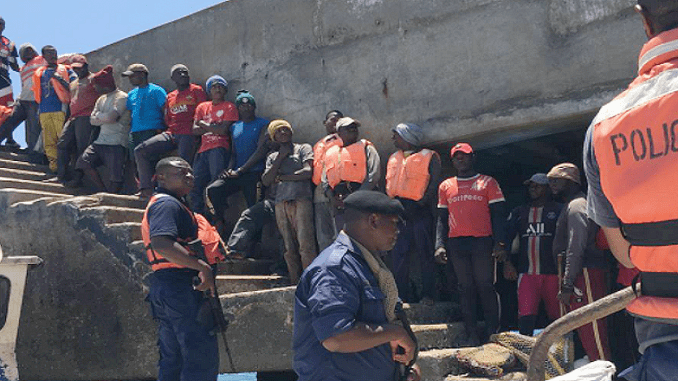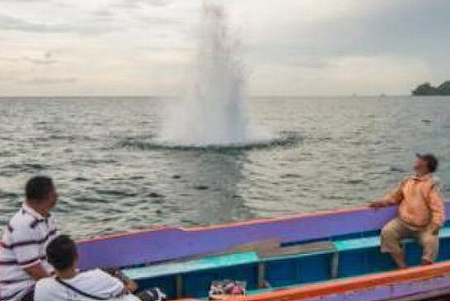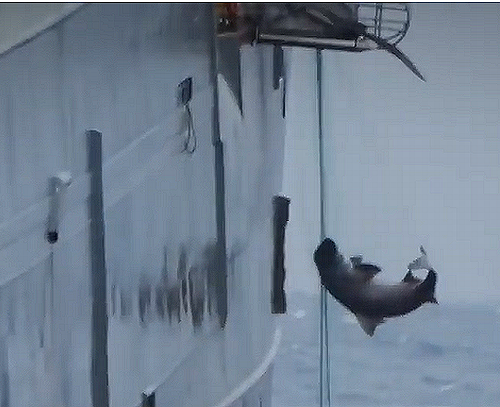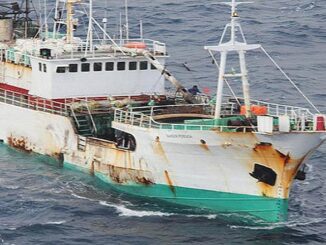
LYON, France, January 30, 2022 (ENS) – Fisheries crime is linked to other serious crimes such as human trafficking and the smuggling of drugs and explosives, Interpol’s environmental and maritime security teams report after a five-month intelligence operation spanning 34 countries and all oceans.
During the operation, the international police force learned that the current depletion of marine living resources is driving a surge in fisheries-related crime.
A total of 1,710 inspections carried out during the one-month tactical phase of Interpol’s Operation Ikatere uncovered over 100 cases of fisheries and other crimes.
More than 40 arrest warrants have already been issued, while many investigations remain ongoing.
Nearly one tonne of illicit products were seized worldwide, including protected fish and wildlife species, drugs and explosives. Law enforcement in Montenegro alone recovered more than 20 cylinders of explosives during the operation.

“The use of explosives as an illegal fishing method is a growing trend amongst the industry’s unscrupulous actors, as the progressive depletion of fish stocks pushes vessels to maintain catch rates at any cost,” said Ilana De Wild, Interpol’s Director of Organized and Emerging Crime.
“Their use also boosts the circulation of explosives that can be used by criminal or terrorist groups. Bomb makers behind terrorist attacks in recent years have been found to also be providing explosives to the illegal fishing industry,” she said.
“Blast fishing is an extremely short-sighted fishing method because it destroys the coral reef on which fisherfolk depend,” said Jerker Tamelander, head of the Coral Reef Unit at UN Environment.
“It is also extremely dangerous to the fisherfolk themselves because bombs can explode prematurely,” he said.
The practice is illegal worldwide, but it persists due to the challenges of detecting, responding and catching the perpetrators.
Damaging Illegal Fishing Masks Other Crimes
Illegal, unreported and unregulated, IUU, fishing is one of the greatest threats to the sustainable use of marine resources, and curbing it is one of the United Nations’ Sustainable Development Goals. Each year, IUU fishing costs the global economy billions of dollars, Interpol said in a statement announcing the results of the operation.
An estimated 20 percent of the world’s total catch stems from IUU fishing, and the amount rises to 40 percent in certain regions such as the coastal waters of some developing countries, the UN Food and Agriculture Organization points out. That means one in every five fish caught is taken illegally, depleting fish populations.

Criminals use fishing vessels to traffic drugs and people because their nomadic navigation patterns and long periods at sea make it easy for these vessels to blend into the maritime background without suspicion, Interpol explains.
Criminal networks use the proceeds of illegal commercial fishing to finance other crimes.
“Human trafficking and modern slavery are also severe problems in the fishing industry,” Interpol warns, pointing to Operation Ikatere, which found 121 men, women and children trafficked on vessels in Lake Victoria, Africa’s largest lake. They were rescued by Kenyan law enforcement.
The operation confirmed the frequent use of false documentation – forged vessel certificates, fake fishing licenses or false crew documents – to launder catches and cover up cases of labor exploitation or human trafficking.
More than 70 vessels allegedly associated with illegal fishing activities were identified during Operation Ikatere, most for failing to submit valid fishing licenses for areas where they were caught fishing.
Executive Director of Police Services at Interpol Stephen Kavanagh said, “The only way to effectively combat the myriad crimes associated with illegal fishing is timely international cooperation between the country inspecting fishing documentation and the country supposed to have issued it.”
“The broad participation in Operation Ikatere – including landlocked countries such as Rwanda – demonstrates the global commitment to enforcing a sustainable stewardship of marine resources,” Kavanagh said. “Our collective sustenance and livelihood depends on it.”
Operation Ikatere was supported by Interpol’s Fisheries Crime Working Group, an international platform for sharing expertise and experience and developing innovative policing approaches to this crime area.
The Interpol Environmental Security Programme and its activities against illegal fisheries are financially supported by the CCAMLR (Commission for the Conservation of Antarctic Marine Living Resources) Secretariat, the Pew Charitable Trusts and the United States Agency for International Development (USAID).
Featured image: Law enforcement officers bust illegal fishing activities and find other crimes during Operation Ikatere, 2021 (Photo courtesy Interpol)
© 2022, Environment News Service. All rights reserved. Content may be quoted only with proper attribution and a direct link to the original article. Full reproduction is prohibited.



